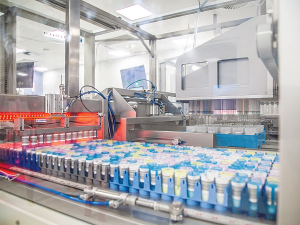LIC lifts half-year revenue on strong demand for dairy genetics
Herd improvement company LIC has posted a 5.2% lift in half-year revenue, thanks to increasing demand for genetics.
 LIC is developing a milk based diagnostic test to give farmers early insight into the facial eczema status of their herd before clinical signs are apparent.
LIC is developing a milk based diagnostic test to give farmers early insight into the facial eczema status of their herd before clinical signs are apparent.
Herd improvement co-operative LIC says it is developing new methods to help farmers tackle facial eczema, a disease which is costing the dairy industry around $30 million in lost production each year.
Facial eczema (FE) is caused by a fungal toxin which is mainly found in summer and autumn pastures in the North Island and Upper South Island. When cattle eat this pasture they ingest the toxin which causes liver damage, lowered production and in some circumstances, skin irritation and peeling.
LIC chief scientist Richard Spelman says the co-operative is leveraging its expertise in genetics and diagnostic testing to help farmers combat the effects of the disease.
"We're focused on helping our farmers optimise value from their livestcok by enabling them to produce the most sustainable and efficient animals," says Spelman.
"There's no cure for facial eczema, so we're working on developing a milk test and a breeding value to give farmers more effective options to help prevent and detect the disease."
Head of VetEnt Research and Te Awamutu veterinarian, Emma Cuttance, says the humid and wet weather created the perfect conditions for the fungus and resulted in a lot of facial eczema in the Waikato.
"We had farmers with whole mobs of cattle with clinical symptoms, which is really tough to see. On the whole this shouldn't be happening but the problem is 95% of the time there is liver damage but you can't see it. It's an iceberg situation."
DairyNZ estimates that for every clinical case of facial eczema, there will be 10 cows that are subclinical - they don't show any physical signs but they have liver damage and milk production can be depressed during the season of damage and the following season as well.
Spelman says LIC is developing a milk based diagnostic test to give farmers early insight into the facial eczema status of their herd before clinical signs are apparent.
"We're working on a milk test which detects liver damage when the herd is exposed to a medium to high toxin level."
Spelman says how this test will be delivered to farmers hasn't been confirmed but the co-op is collaborating with Fonterra to validate whether the test is effective with a bulk milk sample.
"We're also looking into the potential for an individual milk test which could be an add-on to a routine herd test. The individual milk test would provide farmers with a less invasive, more efficient alternative to blood testing."
Cuttance acknowledges the current options for farmers to prevent facial eczema are falling short.
"Zinc is the most common way to prevent facial eczema but the vast majority of the country don't give enough for it to be effective.
There are lots of different areas to be worked on in terms of providing farmers with alternative ways to mitigate the effects of facial eczema - one of those has to be breeding."
Spelman agrees and says the co-op's long-term aim is to develop a facial eczema breeding value, which would allow farmers to breed cows that are more resistant to the disease.
"We know that facial eczema resistance is a heritable trait. If we're able to generate a facial eczema breeding value, we could rank our artificial breeding value, we could rank our artificial breeding bulls based on their resistance for farmers to select from."
To gather the data needed to generate a breeding value, the co-op has collected blood and milk samples from 4,000 cows that have been naturally exposed to facial eczema.
“We’re using ground breaking milk testing alongside traditional blood tests to develop a facial eczema breeding value based on genomics.”
The research into a facial eczema milk test and breeding value is being undertaken through the $25 million Resilient Dairy research programme.
The seven-year Sustainable Food and Fibres Futures programme seeks to enhance the health and wellbeing of the national dairy herd.
“The Resilient Dairy programme strengthens our existing research and development work to keep our farmers and New Zealand leading the global pastoral dairy system,” says Spelman.
Global trade has been thrown into another bout of uncertainty following the overnight ruling by US Supreme Court, striking down President Donald Trump's decision to impose additional tariffs on trading partners.
Controls on the movement of fruit and vegetables in the Auckland suburb of Mt Roskill have been lifted.
Fonterra farmer shareholders and unit holders are in line for another payment in April.
Farmers are being encouraged to take a closer look at the refrigerants running inside their on-farm systems, as international and domestic pressure continues to build on high global warming potential (GWP) 400-series refrigerants.
As expected, Fonterra has lifted its 2025-26 forecast farmgate milk price mid-point to $9.50/kgMS.
Bovonic says a return on investment study has found its automated mastitis detection technology, QuadSense, is delivering financial, labour, and animal-health benefits on New Zealand dairy farms worth an estimated $29,547 per season.
OPINION: Staying with politics, with less than nine months to go before the general elections, there’s confusion in the Labour…
OPINION: Winston Peters' tirade against the free trade deal stitched with India may not be all political posturing by the…